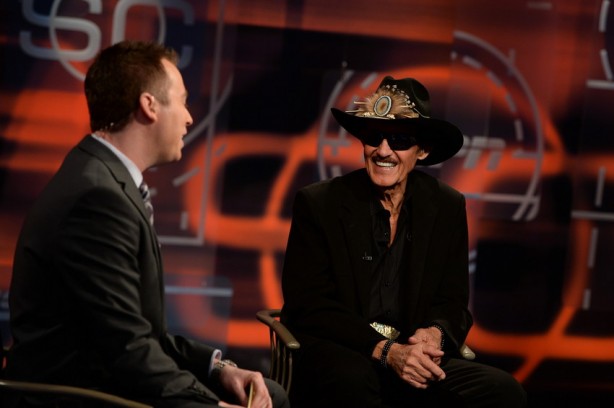NASCAR legend Richard Petty recalls how American auto racing, ESPN have grown together

Three years B.E. (Before ESPN) – this week in 1976 at Daytona – Richard Petty was involved in one of NASCAR’s most memorable finishes. He hit David Pearson’s left front bumper, spinning both racers. Petty’s car stalled short of the finish line and Pearson passed him on the infield grass for the victory.
“A lot of folks told me they saw the race, but no one’s ever told me they saw it on TV,” Petty said when reminded how the Great American Race was covered “back then.”
(Editor’s note: With the 1976 Daytona race run during the Winter Olympics as it will be Sunday, ABC Sports, covering those Innsbruck Games, televised the start of the race, cut away to the Olympics, then returned to Daytona for the final laps.)
“Wide World of Sports would show us delayed – we’d be between mud wrestling and marble throwing, that’s how important we were then,” Petty said with a laugh. “Compared to what it is now, coverage was very haphazard, but it was the latest stuff [technology] they had at that time.”
During his “Car Wash” visit to ESPN’s Bristol, Conn. campus on Monday, “The King” was the epitome of a gentleman. Petty ended many of his answers with “Sir,” and held doors open for his hosts.
“It blew me away,” he said of his first visit several years ago. “Bristol? I knew where Bristol, Tenn. was [site of two NASCAR races annually]. I didn’t know ESPN was in Tennessee. And, I had no concept it was this big. I knew you covered everything, I didn’t know it took this much to cover everything.”
Encouraged to recall the growth of the sport he is “The King” of, NASCAR’s all-time leader in wins (200) tied everything together from his North Carolina roots to his current Richard Petty Motorsports.
In the late 1940s, “baseball was the national pastime, and it went from Boston to Chicago to Washington [D.C.],” Petty said. “Racing went from Washington to the Mississippi, and south. That was our territory. We were the only major sport in the South. Then the Brooklyn Dodgers went to Los Angeles and football started to expand, and we did, too. First RJR Winston in ’71, then STP in ’72 started advertising us all over the country, and in ’79, our big race – Daytona – was live on TV, so it was one step at a time.”
His team is part of NASCAR’s global growth with its two drivers, Aric Almirola and Marcos Ambrose, Cuban-American and Australian, respectively.
“And ESPN’s been real good for us,” Petty said. “You cover us all year long with questions and interviews which really expanded our sport.”
Putting on his businessman’s helmet, he added, “On the other hand, racing helped sell you guys – people want to see racing. You were an upstart, we were an upstart, and we all became major league together.”







